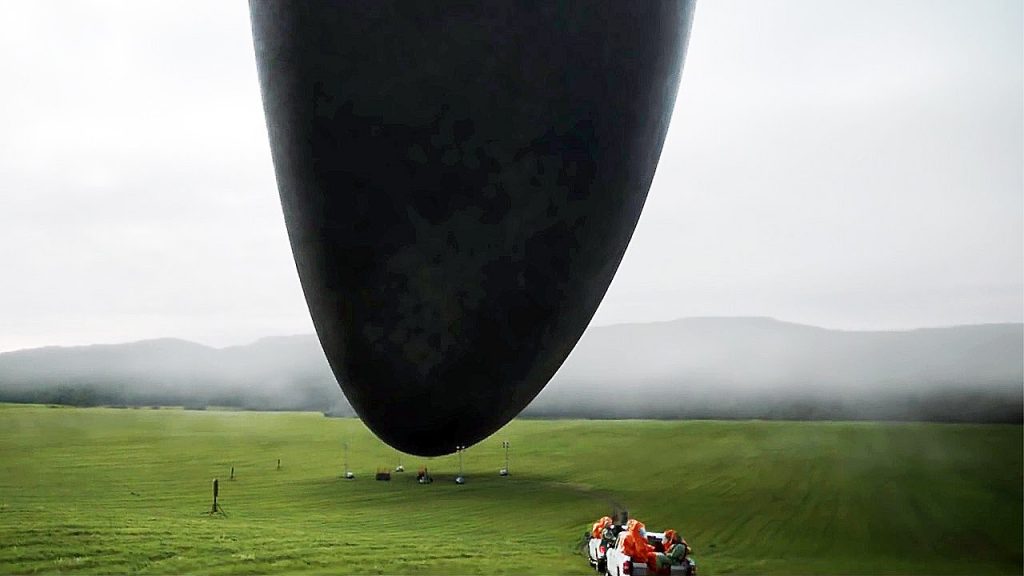The marketing campaign for Arrival touts the movie’s 100% rating on Rotten Tomatoes. It doesn’t mention that this rating comes from only 69 critics. Nevertheless, it’s a remarkable statistic and, while I don’t expect it to remain at 100% once it opens in theaters, I do expect the number to remain very high. I’d give it a 90%, mostly because very few movies are absolutely perfect. 90% is as close to perfect as I come these days.
The one aspect of Arrival that I find less than perfect is the continued use of flashbacks with Amy Adams’s character, Dr. Louis Banks. The movie opens with images of the single mother raising her daughter, ending with her premature death as a teenager. Banks is haunted throughout the movie with recollections of the experience. While you know they’re going to eventually have a huge impact on the story, it takes just a little too long to reveal it.
There’s a reason her memories appear in her dreams, as well as during her waking hours, as she’s trying to decipher the language of visiting aliens that have planted their ships in 12 seemingly random locations around the globe. When this reason comes, it’s all been worth it; however, right before then, you may feel like you’ve been confronted with her past one too many times. I suppose your frustration watching the movie could mirror hers during her impossible task.

Other than that, there’s nothing even slightly negative I can say about Arrival. Adams is the best she’s ever been in the role. Following the movie’s introduction, she’s a visibly sad woman, oblivious to the news that’s erupting around her, learning about it only when the three people who show up for class ask her to turn on the television. Even when the college is closed and she returns home, she’s barely shaken by potentially world-changing events.
Banks is an empty shell of a woman. Interesting, then, that authorities call the hovering ships, “shells.” Colonel Weber (Forest Whitaker) recruits her and Ian Donnelly (Jeremy Renner) for work at one of the sites, in Montana. She’s a linguist and he’s an engineer. They’re both assigned teams with the goal of learning the purpose of the “heptapods,” as the eight-armed/legged/tentacle creatures come to be known.
The key to the entire story is the language of the heptapods and what it means. When Banks cracks the code (if she does), not only will the story be resolved, but the point of the movie will be explained. Her method of writing single words on a whiteboard (“human”) is primitive compared to the beautiful and elaborate symbols the aliens create by spraying ink into the mist on the other side of a clear barrier that separates the two species inside one of the shells.
I could almost recount the entire plot of Arrival, from beginning to end without spoiling the movie, its true story being buried so deeply within the events it depicts. It’s no doubt science-fiction on the surface; but, beneath, it’s one of the most real human dramas I’ve ever seen. It uses the fantastic as a device to make you think in order to uncover enlightening truths about humanity. It’s true science-fiction, not space opera like Star Wars.

On the surface, though, it’s still entertaining and suspenseful, with the potential to please those who don’t want to find a deeper meaning. It offers a completely realistic scenario for alien invasion, from how people learn about it to how they react. It’s timely, as well, because how do some of us good ol’ Americans react? It’s with looting and violence, of course. And how do 12 different nations react? It’s with the threat of violence, of course.
That’s what propels the story forward. Cooperating at first, the countries hosting heptapod ships eventually horde their own information and a particularly impatient Chinese general interprets their failure to communicate as an act of aggression. Therefore, the whole thing becomes a race against time. If Banks, Donnelly and company can’t prove that “weapon” doesn’t necessarily mean “weapon,” China will bomb their shell and other nations will follow suit.
Screenwriter Eric Heisserer makes a significant gain in credibility with Arrival, following his work on a different class of projects with Final Destination 5, The Thing and Lights Out. Director Denis Villeneuve continues his already credible career, following his work on Incendies, Prisoners
and Sicario. This movie is something special. Rarely does one reach for the stars (literally and figuratively) and go so far beyond.


